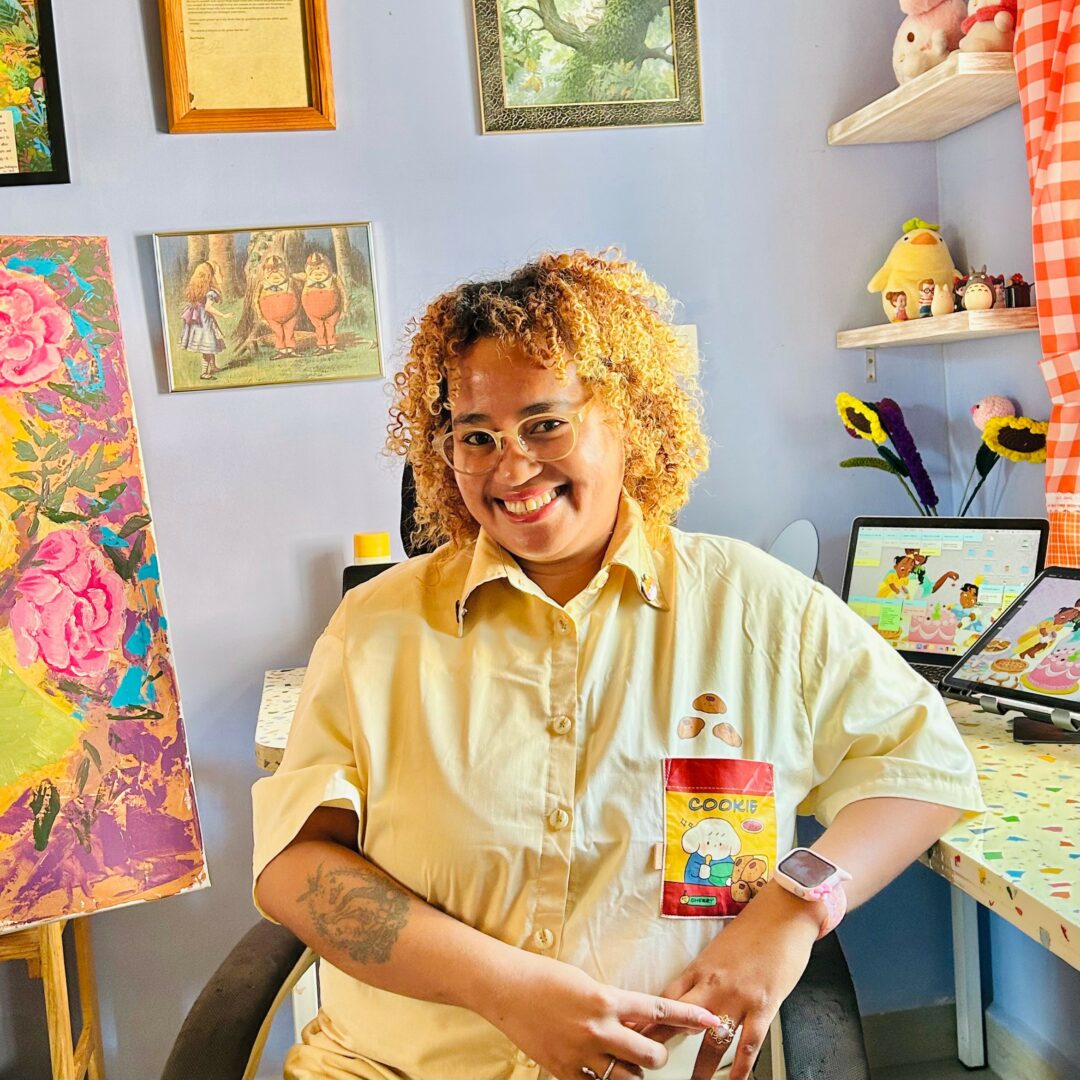We’re excited to introduce you to the always interesting and insightful Batsheva Guy. We hope you’ll enjoy our conversation with Batsheva below.
Batsheva, thank you so much for joining us today and appreciate you talking about a sensitive topic. It’s unfortunately relevant to so many in the community as layoffs have been on the rise recently, and so we’d appreciate hearing your story and how you overcame being let go?
How did you overcome a layoff and/or getting fired?
I got fired from my role as a Diversity, Equity, and Inclusion (DEI) consultant for putting my pronouns in my email signature.
Yeah, you read that right. I’ll give you a sec to digest it.
How did I overcome it? I leaned into it. Let me paint y’all a picture…
“Do you have a sweater?”
I stared blankly, not fully understanding the question that seemingly came out of the blue.
“Do you have a sweater at your desk?”
“Um, yes, why?”
“I can’t have your tattoos showing for this meeting. We don’t do that here.”
This was a conversation I had with my boss at a large Catholic hospital system in Cincinnati. I’d been doing the DEI consultant gig for about a month, and this request came as a massive shock to me.
There had been other red flags—subtle comments about my appearance, dismissive attitudes toward my suggestions—but this felt like a huge blow. Not to mention a deep disrespect to my identity and principles. How could I, in good conscience, carry out DEI efforts that were clearly performative if I couldn’t even be my authentic self at work?
I tried talking to my boss about how I felt, and she basically told me to deal with it. She mentioned that she had tattoos, too, and just had to hide them and that “change comes slowly.” Whatever. It was clear that my concerns were not going to be taken seriously, and I felt increasingly isolated in an environment that preached inclusivity but practiced conformity.
I decided to ride it out for a bit and casually keep an eye out for other opportunities. They’d probably call it “quiet quitting” now. I did exactly what I had to do in my job and nothing else. I tried to stay under the radar. Which is really, really hard for me.
Anyway, things simmered down after that. Or so I thought.
A couple of weeks later, I received the dreaded “meet me in the conference room” email. My stomach dropped. I had a feeling I was in trouble, and sure enough, our HR rep was sitting right there next to my boss. Not a good sign.
“We’ve been discussing some concerns,” my boss started, her tone clipped. She expressed distaste with my visible tattoos, my active presence on LinkedIn, and the fact that I include my pronouns in my email signature—these ‘transgressions’ were against policy and “not aligned with our professional standards.”
Um, WTF? My LinkedIn presence? My pronouns? These were integral to who I am, both personally and professionally. I had worked tirelessly to establish myself as a DEI professional, advocating for authenticity and inclusivity. Yet here I was, being told that my own identity was a problem.
Then came the kicker. “I would not say I worked at this company on Facebook and then post pictures of myself drinking beers every weekend,” the HR rep added, implying that my online presence was somehow damaging the company’s image. They instructed me to remove my affiliation with the company from my LinkedIn profile. Keep in mind, this was when my LinkedIn content way WAY milder than it is now. I talked a bit about authenticity in the workplace but wasn’t super active on the platform.
As a result, I was put on probation, with a stern warning to “tone it down.”
A week later, I was called into that same conference room.
I texted my husband, “I think I am about to get fired lol.”
I got fired. Lol.
Little did I know, this was the start of my redefining professionalism journey. I posted about my experience on LinkedIn almost immediately, and my post went viral. And just like that, unexpectedly, I started building a community of peers, followers, and friends.
So I posted again. And again.
…and again.
Like I said, I leaned into it.
Before I knew it, I had a pretty solid personal brand as a professional troublemaker and positive disruptor. I make it clear that my tattoos do not prevent me from doing my job and doing it well. I share authentic, antiracist content and encourage everyone to reflect and question what professionalism is and what it isn’t.
Professionalism is accountability. It is not a suit and tie.
Professionalism is reliability. It is not return to office.
Professionalism as we currently define it is deeply rooted in white supremacy and is used as a tool to control and suppress employees. “Professionalism” as we know it is conformity, and that is why it is crucial to redefine it.
I committed myself to redefining professionalism—not just for myself, but for everyone who has ever felt like I felt. Authenticity is not a liability; it’s a strength.
And, most importantly, I promised myself to never work for an employer where I couldn’t be unapologetically me.
I did eventually land a phenomenal role at Huron as a Change Management Consultant, where I can still pursue my DEI passions. I have been at Huron for two years and some change now, and I truly feel I can be myself at work. I am accepted as I am with all my quirks and tattoos along with my skills and talent.
I am appreciated not in spite of but because of my uniqueness (and even my loud mouth).
Redefining professionalism means embracing our true selves and recognizing that diversity in appearance, identity, and expression enriches our workplaces. My story is just one example of the many battles fought to bring about this change, and I am determined to be on the front lines, pushing for a world where we all can be who we truly are—unapologetically.
Great, so let’s take a few minutes and cover your story. What should folks know about you and what you do?
I am on a mission to redefine professionalism. Professionalism as we know it today is an outdated concept rooted in control and conformity. Whether you are covered in tattoos, employ vocal fry, or wear your hair in locs, you ARE professional because of your skills and the care you put into the work you do. Redefining the way we traditionally view professionalism paves the way for equity and inclusion in the workplace.
You can join the movement as we challenge traditional notions of professionalism here: https://www.linkedin.com/newsletters/7203754582986866688/
Get your professional troublemaker swag here: https://professionaltroublemakers.myspreadshop.com/
Visit my website (shevaguy.com) or follow my LinkedIn for more: https://www.linkedin.com/in/batsheva-guy/
Looking back, what do you think were the three qualities, skills, or areas of knowledge that were most impactful in your journey? What advice do you have for folks who are early in their journey in terms of how they can best develop or improve on these?
1. Authenticity: Embracing authenticity has been essential in establishing trust and genuine connections. By being true to myself and transparent with others, I’ve fostered environments where people feel safe to express their true selves, enhancing collaboration and innovation.
For those early in their journey, focus on understanding and embracing your unique strengths, values, and perspectives. Practice self-reflection and mindfulness to stay aligned with your true self. Don’t be afraid to share your authentic story, including your challenges and successes, as it can inspire and empower others.
2. Self-Care: Prioritizing self-care has been vital in maintaining my physical, mental, and emotional well-being. It has provided me with the resilience and energy needed to navigate the demands of my professional and personal life.
Develop a self-care routine that includes activities promoting relaxation, health, and happiness. Set boundaries to protect your time and energy, and don’t hesitate to seek support when needed.
Self-care is not selfish; it’s essential.
And, remember, self-care looks different for everyone! It’s not just yoga and meditation — it can be reading, walking, doing puzzles, watching silly YouTube videos, maybe playing pickle ball because everyone apparently does that now. Find whatever works for you!
3. Gumption: Having gumption has enabled me to take initiative, overcome obstacles, and pursue my goals with determination and courage. This quality has been instrumental in driving innovation and positive change in my work.
Cultivate gumption by setting ambitious goals and taking proactive steps to achieve them. Embrace challenges as opportunities for growth, and don’t fear failure—it’s a learning experience. Surround yourself with supportive allies who encourage and embolden you, and always stay true to your vision and values.
And, most importantly — hold yourself and others accountable. Accountability is a critical component to success with integrity.
Other advice:
Invest in your personal and professional development through courses, workshops, and certifications. Stay updated on the latest research and best practices in your field.
Build a strong network of mentors, peers, and colleagues who can provide support, guidance, and diverse perspectives. Attend conferences, join professional organizations, and participate in online communities. DM me for more networking tips 😉
Awesome, really appreciate you opening up with us today and before we close maybe you can share a book recommendation with us. Has there been a book that’s been impactful in your growth and development?
Feminist Fight Club!! I recommend this to EVERYONE for so many reasons.
In a nutshell, Feminist Fight Club is a witty and insightful guide to navigating and combating sexism in the workplace. One of the most valuable lessons it emphasizes is the importance of intersectionality, recognizing that different women face distinct challenges in the workplace based on the intersection of gender with race, ethnicity, sexuality, and other marginalized identities. My feminism will be intersectional or it will be bullshit!!!!
I also really appreciate this book’s focus on women lifting up women. There is a special place in hell for women who do not support other women!!! Building a supportive network of allies who offer advice, encouragement, and solidarity is EVERYTHING.
The idea of a “Fight Club” where women help each other navigate challenges and celebrate successes has been instrumental in my journey. The supportive community I have cultivated has provided mentorship, feedback, and a sense of belonging– it has become invaluable for me.
Feminist Fight Club also started my journey in challenging my perceptions of professionalism, particularly regarding my own employment of “Valley Girl” speech and vocal fry. I was (yes — WAS) always self-conscious about the way I speak. I’ve been given feedback like “she sounds too academic but also says ‘like’ a lot.” Like, what??? Am I too academic or too vapid — which is it???
Feminist Fight Club underscores that women are at the forefront of linguistic movements and that these speech patterns are not inherently unprofessional. This perspective helped me be less judgmental and embrace these parts of myself, fostering greater self-acceptance and authenticity.
The practical strategies for self-advocacy provided in the book have also proven to be incredibly useful. Using the negotiation guide from the book, I negotiated a higher salary for the first time EVER in my current role– and it paid off…literally!!
Contact Info:
- Website: shevaguy.com
- Linkedin: https://www.linkedin.com/in/batsheva-guy/
- Other: https://linktr.ee/ShevaGuy https://professionaltroublemakers.myspreadshop.com/ https://www.patreon.com/ProfessionalTroublemaker










